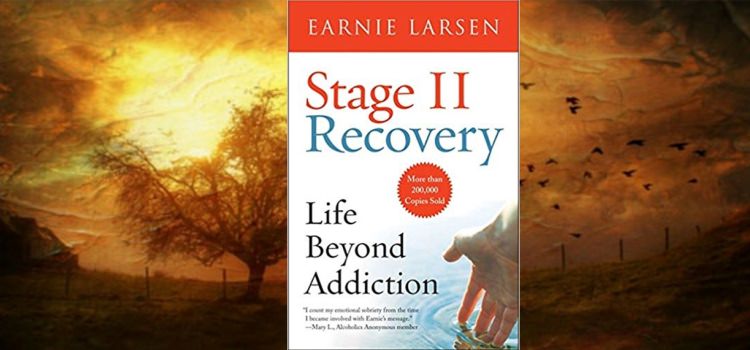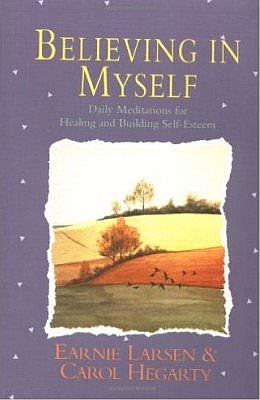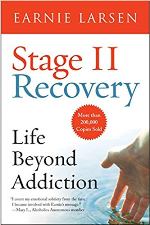Stage II Recovery: Life Beyond Addiction

I count my emotional sobriety from the time I became involved with Earnie’s message.
Mary L, a member of AA
By life-j
Here’s the book we’ve all been waiting for. Or rather, it’s been waiting for us.
It was published in 1985. I don’t know how it could have gone so unnoticed all these years. I first read it about 15 years ago, and just pulled it down off the shelf and re-read it this last week. It is a mere hundred pages of practical recovery advice. It uses many of the best elements of 12 step recovery, but with no nonsense, no religion, not even any twelves. It’s not even “a program” per se; it just has a lot of good advice on how a person can put together a good program of action for themselves.
Stage II recovery is when we’ve sobered up and gotten a bit stable not drinking, and the real work begins.
The author, Earnie Larsen, was a therapist (died 2011) and seems to have had some association with 12 step recovery. He doesn’t put it down, but he kind of ignores it, and just lays out a much simpler bunch of recovery tools. And he does it almost completely without any higher power talk, though he does promote prayer and meditation briefly – both mostly as a non-religious contemplation practice.
He doesn’t talk about “character defects”. Instead he calls our problems “habits”, not even bad habits, just habits, and acknowledges that some habits can be useful, but most cause us trouble. So here already, there is no judgment, no defects, no shortcomings, no moralizing, that needs to be resolved by a deity. There are just habits that don’t serve us. He calls everything habits, even concepts like insecurity, it’s all habits we need to change. It’s a bit like a “comfort zone”: something which we have gotten ourselves used to and which in some cases can be quite comfortable because of its familiarity, but for the most part the habits only leave us stuck in dysfunctional patterns and relationships.
This is simply a book with recovery advice, slightly different than others in its approach, but anyone who isn’t stuck on following a specific program to the letter can benefit from this. Most certainly AA members, because many elements are similar to the 12 step program.
It’s just laid out much simpler.
Most of all, recovery is about change, and he stresses that our program needs to be one of action. If we don’t change our habits, our life, we will not get much benefit from not drinking. We know this, of course, but so much AA recovery gets lost in the labyrinths of finding a god to turn the whole mess over to instead of focusing on doing something about it.
So Earnie starts out by defining Stage I recovery: Sustained abstinence. And that’s as far as many people get, and mostly because they don’t have a clear enough program of action. So he starts with the following statement which is good for staying out of arguments within 12 Step fellowships:
Let me also hasten to emphasize that Stage II is not for people who think they have “outgrown” the Twelve Steps. It is not possible to outgrow the Twelve Steps. The spiritual wisdom embodied in the Twelve Steps is infinite. But as the program teaches, the steps can only take us as far as we allow them to take us. And, as in so many areas of our lives, we are usually only willing to go so far. Beyond that we tend to float, in effect settling for “where we are”, because we don’t have the vision, or the will, or the know-how to do any better.
[Stage II Recovery, p. 7, author’s emphases and quotation marks]
And while I would perhaps assert that many of us are likely to outgrow many aspects of the 12 steps, overall his point is well taken: most of us only get so far. So from here on he lays out a variety of problem areas and practical suggestions for action.
Chapter 1: RECOVERY IS THE GOAL. First a couple of pages warning about switching addictions, then a bit of defining recovery. We need to – each one of us – define what recovery means. It will more or less mean the same thing to all of us anyway – broadly speaking, dealing with our problems – but we each need to define what it is going to require from us. We need to define our own specific problem areas, and what the solution may look like.
A lot of our problem is in our relationships. Not that a lone drunk won’t have problems, but these will be directly related to his drinking. It is often in our relationships with other people that our problems with real recovery really play out.
Chapter 2 is about SELF-DEFEATING LEARNED BEHAVIORS. He lists the most common problematic personality traits: caretakers, people pleasers, martyrs, workaholics, perfectionists, tap dancers. Personally I can relate to all these categories, and all the more since they seem a bit under-represented in standard AA literature, but it might have been good to include a couple of others such as bullies and the aggressive and actively controlling types.
So he goes over these with many descriptions to encourage the readers to take a closer and more honest look at themselves.
Chapter 3, HABITS. He goes into how these traits play out in the form of bad habits: “Who’s driving the Bus?” We live our lives out of habits, most things we do are not based on informed rational decisions, but on habits, acquired patterns of action which at one time may have served us, but no longer do.
“Habits defend reality” – at least the reality we see, “our” reality, not necessarily “the” reality. They defend our unserviceable outlooks on life, encourage us to seek the comfort of the familiar, and the familiar will always be more comfortable than the unfamiliar. If we are going to change we will be operating primarily in unfamiliar territory, and that is why recovery is uncomfortable, and why we so easily try to avoid growing. We will take a bad, familiar situation over a better, unfamiliar one, because moving to the better one will saddle us with all manner of discomfort, until we learn how to handle the new one. That takes practice, and exposure, lots of both, sometimes a seemingly insurmountable amount of both, but there is no way around it.
Chapter 4, CHANGE, lists many examples, and issues. Our unmanageable relationships. Spiritual reality – he explains that we usually already know rationally that change is needed, but that rationality rarely suffices, or even helps a damn bit, until we reach an inner understanding which usually isn’t arrived at rationally, but more rather experientially, which is a pretty good down to earth definition of spirituality. Changes vs Change: changes imply that we are numbering them, and limiting them, while change is just one thing, everything. Changing others (doesn’t work). Enabling. Systems. And more.
Chapter 5 is all about WORKING A PROGRAM. Here he begins outlining how you can put together a program that works for you and deals with your own particular issues (and may I add, not just the handful of problems Bill W. defined for himself on behalf of everyone else). A program needs to be concrete, practical, focused, and consistent. And so he goes into defining that.
The most important thing about having a program is that it gives you something to do, a course of action. This is part of why the 12 steps do work – they give you something to do. They may not be the best, they may not always put you to work on the stuff that most needs work, but they are a whole lot better than a program of non-action which states that you just need to stop drinking and all will be well. We need to change our whole life, and we need a program that will give us a course of action to do that. To help with the design of our own program, he gives us a checklist, and explains how each part of it works. It’s good and practical.
Chapter 6 is about RELATIONSHIPS, and finally Chapter 7, SUCCESS, where, rather than lengthy individual stories like in the Big Book and many other self-help books, he just has a half dozen pages of good recovery quotes/affirmations. Let me pick a couple to wrap it up:
Even though it’s not easy, I feel new inner strength as I take control over my life. I’ve made some drastic changes, and it’s a wonder that I’m not an emotional wreck, but I’m not.
I don’t let other people determine my moods anymore. Best of all, I don’t feel guilty about it.
I’ve been sober so long myself that statements like these hardly seem all that profound anymore, but I vaguely remember how much it once mattered to me to hear stuff like this said out loud. There’s always a liability in letting an old-timer review a book mostly intended for relative newcomers.

Earnie Larsen seems to mostly address people whose primary initial personality characteristic runs toward low self esteem rather than an inflated ego. As such it goes along well with my own recent article, Fix Broken Self Esteem with Ego Deflation, Huh?, posted on AA Beyond Belief.
So of course I like this book. I believe his understanding and explanation of Stage II can help virtually all of us in recovery.
Finally let me also briefly mention another book of his without going into a review of it here – the daily reader, Believing in Myself, which he co-wrote with Carol Hegarty. It has been one of my favorites for a couple of years now. There is practically no god stuff in there, and most of the entries are about empowerment, having the courage to live our lives more fully.
 life-j got sober in Oakland in 1988. He moved to a Northern California coastal mountain village in 2002 and helped wake up the sleepy AA fellowship there.
life-j got sober in Oakland in 1988. He moved to a Northern California coastal mountain village in 2002 and helped wake up the sleepy AA fellowship there.
He has written a number of articles posted on both AA Agnostica. You can read and/or download his book as a PDF right here: Collected Published AA Stories.


























Sunday morning is a good day to get up early and see what kind of gift AA Agnostica and AA Beyond Belief have arranged for me. And today another gift from my prolific friend, Life J. hits the spot well.
Thank you one more time, Life.
These books look great and I like what you say about having a plan of action rather than just being who you simply are minus the drinking. I’m focusing on what feeling I’m trying to either escape or create when I wish I had a drink. Observation, perseverance, and a new way of living is what’s needed. Thanks.
Thanks again for sharing your thoughts. I promise not to pervert them in my own pursuit of the truth! I have heard of Larsen’s book, but have never read it. On the strength of your recommendation, I’m gonna take a look. My personal experience is that SO much of it is all about habit formation, neuro-plasticity, and perpetual habit re-formation. A lifelong game, indeed. Thank you for your lifelong contributions…
Thanks so much life-j for this excellent review of Earnie Larsen’s Stage II Recovery: Life Beyond Addiction. It has been one of my favorite recovery books since I first bought it in 1985 and used it in my private practice with recovering addicts, especially those, like me, who experienced difficulty with relationships.
Earnie, by the way, was a long-time counselor at the famed Hazelden Treatment Center in Minnesota and published some 40 other books with them.
Book reports can be a tricky thing to write. One wants to convey a sense of the content without retelling the whole tale. Great balance here – nice job, life-j. The book sounds quite interesting.
Life, thank-you for this well written review. It sounds like a book I would enjoy reading.
Thank you Life and Roger – I needed this. The principles of the steps work for me, so finding ways of putting them into action, without God taking charge, is part of my “new life.”
Wow! We’ve sure strayed away from the “original” intention of working the steps.
Jimmy, thanks for chiming in. I guess that depends on whether the “original intention” is to “stay sober, get well, live right” or it is to “establish our relationship with god”, as per page 29 of the BB. If it’s the latter, yes, I can see how this approach could leave something to be desired. If it’s the former, I fail to see the problem.
As with your current article and your many comments at aaagnostica and aabeyondbelief, life-j, your ability to discern the crux of the matter and explain it clearly is true to form and singularly impressive!
I read the article that you wrote Fix Broken Self Esteem with Ego Deflation, Huh? OMG I could so identify!! I got sober in February of 1977 so just celebrated 42 years. I disagreed with so much in AA when I first came in and so often felt confused and unable to say how I felt. I also felt that I didn’t have a right to my own opinion (my own low self esteem). However, like you say, I didn’t have another option so I stayed sober “one day at a time” because of some of the really great people in AA who I could identify with. I didn’t feel so alone. Now I attend the agnostic meeting that Roger C. started and it is oh so good!! Thank you so much for this really great article life-j!!
I cannot bypass the opportunity to say a few words about the upcoming 500th post – a MONUMENTAL event. This website began as a posting of Toronto’s agnostic meetings that had been delisted by the local intergroup. What it became is SO, SO much more!
When the history of AA in the twenty-first century gets written, AA Agnostica has earned an important place in that narrative. This website became, and remains, a center of the international secular AA movement. Thanks to the many exceptional writers over the years who have brought us high caliber articles on a variety of subjects.
Our greatest gratitude should go to Roger for his dedication, hard work, editing skills, wisdom, and good judgment.
Merci, mon ami.
Thanks, bob. Your words are very kind. And wait until you see article 499 this coming Sunday. Freaken Awesome, Monsieur Robert!
I enjoyed this article the day it came out and I’ve been enjoying the discussion that’s followed. Earnie Larson, which would be obvious for anyone like Life who’s read Earnie, has been a big influence on my recovery and my own writing style.
Earnie was one of the pioneers in the work on Adult Child Syndrome (ACS), originally looking at adult children of alcoholics. It soon found an audience with all manners of dysfunctional upbringings and the damage and maladaptive coping techniques that get brought into adult life. The Larson collection of books and his peers were must reads in the ACA (another 12 Step Fellowship that grew from both Al-Anon and AA members). I think his material stands the test of time.
Another of my fav’s from the era, worth looking for in second-hand book stores if you’re on a budget, Under The Influence: A Guide to the Myths and Realities of Alcoholism, James R. Milam and Katherine Ketcham (1981).
Thanks Life/Roger et al.
Any info on secular ACA? I cannot go to another meeting, in person or online. I qualify, very much, but the religious crap drives me nuts. In my exp. an association with “normal” ACA seriously messed me up. Thanks!
Thanks all who joined the discussion, and your kind feedback. And indeed a big thanks to Roger for getting this whole movement off the ground with this great site, and congrats for the near 500 mark of articles. An impressive accomplishment, and impressive organizational skills. And not least, thanks for that I can count you among my friends.
Thank you for your focus on Earnie Larson’s book. I had the benefit of working with some of his programs in Self-Esteem and Adult Children of Alcoholics. He was passionate as well as inspiring. I still hear him saying, “If nothing changes, nothing changes!” I lost my copy of his book in the Carr fire in Redding CA last summer. The fire altered my life physically by taking my possessions. But my closeness to the 12 Steps and awareness of Stage II Recovery keeps me moving forward.